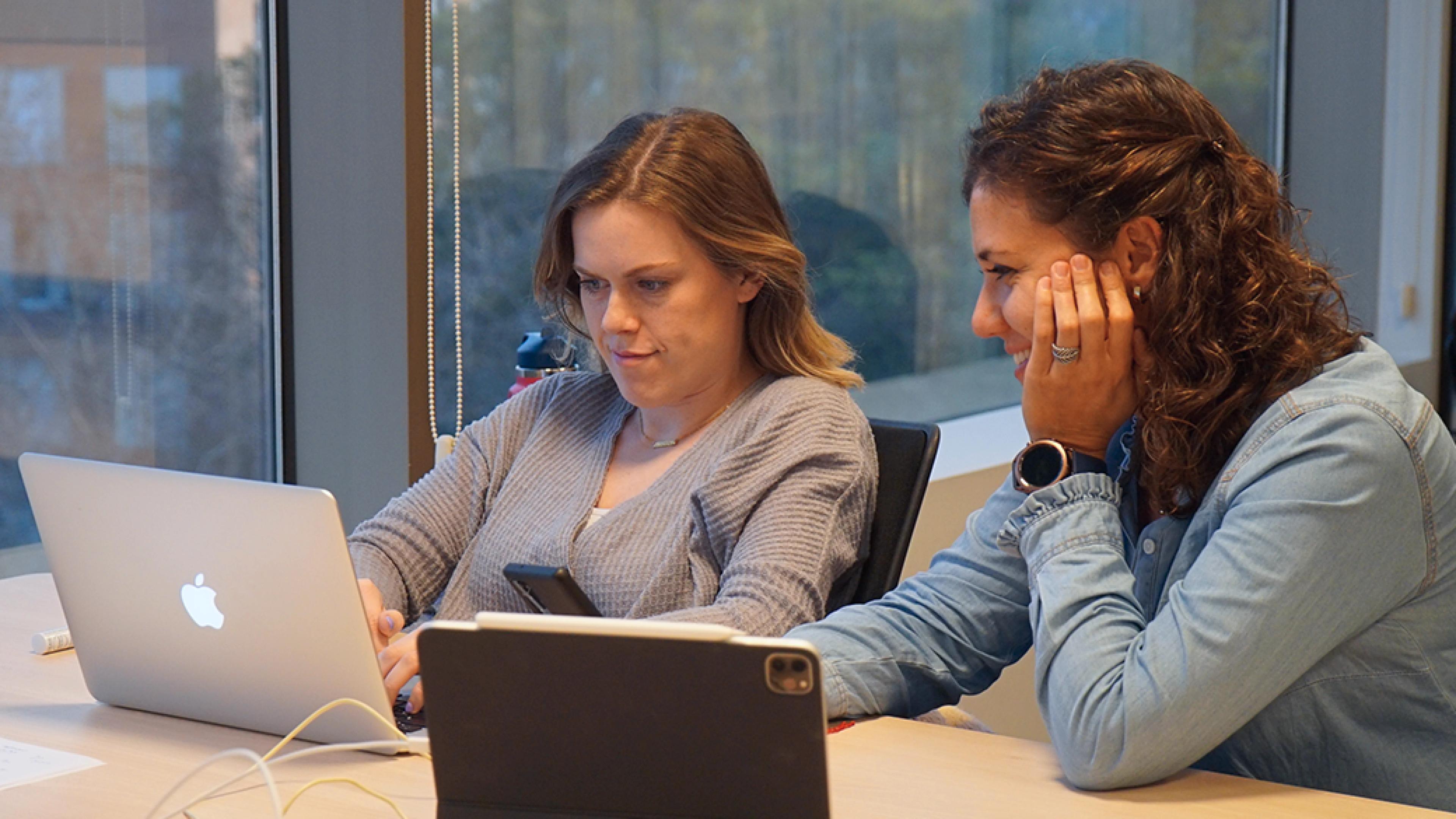5 Common Myths About Studying a Master’s Abroad
Dive into the truth behind studying abroad for master's degrees. Uncover job market advantages, diverse programs, language bridges, and scholarship opportunities.

Copywriter at Harbour.Space University
Dive into the truth behind studying abroad for master's degrees. Uncover job market advantages, diverse programs, language bridges, and scholarship opportunities.
Are you looking to level up in your career and considering a master's degree abroad? You're not alone! Over 100,000 U.S. students enrolled in master's programs at foreign universities in 2020-2021, up from 70,000 in 2010-2011(IIE). This represents a growth of over 40% in just ten years. And there are several reasons for this rising trend.
A study by the Financial Times found that international students are more likely to be hired after graduation than domestic students. So upon graduation, you will have an immediate competitive edge in the job market. Why is that?
Our world is becoming globalized, and employers know international students have a strong work ethic, are adaptable to new cultures, and tend to be fluent in multiple languages. They’re also more likely to be self-motivated and independent, which is highly valued by employers.
The best part? You can develop this edge while escaping the rising cost of graduate school in the United States, as tuition abroad is often significantly lower.
We get it. Making this leap, or knowing if getting your master’s abroad is the right decision for you, is tough. So in this blog, we'll debunk common study abroad myths and provide accurate information to help you make an informed decision and feel confident about doing so.
Myth 1: Studying Abroad Is Only for Undergraduate Students
This is a common misconception as we tend to relate studying abroad just for undergraduates. However, this is not the case. There are many advantages to pursuing a master's degree abroad besides the facts presented initially.
For one, worldwide networking opportunities! Studying abroad helps you build a global network of valuable contacts for your career. You meet students and professionals from all over the world via the classroom and conferences or networking events related to your industry or topics of interest.
For instance, Europe alone hosted 33.9% of all global conferences in 2021, making it the most popular destination for conferences worldwide (ICCA).

Europe is also home to many world-renowned universities and research institutions, making it a great place to hold conferences on academic topics, as delegates can have the opportunity to network with leading experts in their field.
Secondly, universities abroad offer diverse academic offerings. Unlike the more traditional system in the U.S., there’s a more interdisciplinary approach to learning. This means you can study different subjects to become a multi-talented professional - crafting and tailoring your experience to meet your career goals.
Plus, programs abroad also tend to offer more specialized and niche programs; for example, a Master's in Product Management, Front-end Development, or Digital Transformation.
Here is a success story of a U.S. student who excelled in their master's program abroad. Meet Lucas Shaff, a once marketer working for a resort in Reno, Nevada, to now founder and CEO of his digital agency, StratMark.

Building the agency was his life’s desire, and now, Lucas was able, as he conveys, “to culminate a year's worth of hard work and dedication into a career that I am in control of. That is a dream come true.” This was all made possible by the confidence and skills he gained while at Harbour.Space University in the Digital Marketing Master Program.
Myth 2: Master's Programs Abroad Lack Quality and Reputation
This is simply not true. 25 of the top 100 universities in the world are outside of the United States (QS World University Rankings), holding graduate degrees to the same high standards as those offered in the United States.
And for lacking quality? This is far from reality. Enrolling in a master's program abroad means (other than growing your skill set) signing up for global lifelong friends, new perspectives and appreciation for different cultures, and developing cross-cultural communication skills.

Ultimately, you will gain a new understanding of yourself and your place in the world - an invaluable learning that will ignite your future career, regardless of your field.
Myth 3: Language Barrier Makes Studying Abroad Difficult
One of the biggest concerns you might have is the language barrier. But this can easily be debunked. First, many universities offer English-language programs specifically designed for international students. So your classes, coursework, and exams will all be in English.
Second, many resources are available to help you learn the local language for daily use outside the classroom. These resources include language classes, online resources, and language exchange programs. So no, you do not need to know a foreign language before you study abroad. However, studying a few phrases before moving to adapt better to the culture is always beneficial.
Still not sure? Hear from Annie Frische, who studied for her master’s abroad after completing her bachelor’s degree at Oklahoma State.
Being from Texas and moving to Barcelona, Spain, I broadened my cultural perspective, developed cross-cultural communication skills that hardly existed, and learned Spanish, a language hugely beneficial in the United States. The overall experience was a win-win: igniting my career with the skills and confidence gained and finding my place in this world.

Myth 4: Studying Abroad Delays Career Progression
Actually…quite the opposite. Studying abroad accelerates your career progression. As our world globalizes, employers are increasingly looking for candidates with international experience, as mentioned previously. But to further back this, let’s take a look at the numbers.
63% of employers said they would be more likely to hire a candidate with international experience (National Association of Colleges and Employers), and 94% said they need employees with cross-cultural skills (World Economic Forum).
Not to mention, a year abroad could come with a higher salary. A study by the National Association of Colleges and Employers found that students who studied abroad earned an average of $10,000 more per year than those who did not.
On top of that, your master’s abroad will help you to build a network of international contacts, which open up new career opportunities for you. Hear it from Julian Paul, a High-tech Entrepreneurship alum who, as of today, has launched HUSTLE OS, HUSTLE Tools and worthy.domains.

“Before, I thought I knew how this start-up thing worked. But I was wrong. At HS, I learned by doing. Failing repeatedly is one of the best experiences you can have as an entrepreneur”.
Julian revealed that Ann Hiatt was one of his most influential teachers at HS. She greatly inspired him because she worked with Jeff Bezos in Amazon’s early days.
“You could say she really knows how those Silicon Valley high achievers tick. Her advice on character and grit was pure gold.”
Myth 5: Financial Concerns Make Studying Abroad Infeasible
Getting your master’s abroad is a smart way to invest in yourself and your future. And popular to the contrary belief, scholarships and assistantships are available for international students, not just locals.
We don’t mean a one-off scholarship that will hardly cover the plane ticket. We’re talking scholarships covering up to 25-100% of your tuition. Also, apprenticeships could give you a stipend to cover living expenses and give you a part-time job with the potential of becoming full-time after graduation.
It’s important to remember that getting your master’s abroad is a priceless investment in your future. The skills and experiences you gain can help you land a better job and earn a higher salary. In the long run, the benefits may outweigh the cost of studying abroad.
Hear from our next success story, Margherita, or ‘Maggie,’ to her friends. She studied Interaction Design at Harbour.Space University now works her dream job at one of the most awarded interactive agencies in the world, Jam3.

The agency has offices in Toronto, Los Angeles, New York and Amsterdam. Some of their clients have been Levi’s, Adidas, Sephora, MTV, Disney Pixar, Google, Spotify, Microsoft, and Ford, among many others.
With recommendations to all, she says, “keep trying, and if you fail, try again. Don’t stand still and wait for life to happen, take action, because you will eventually reach your goals. Never think that you’ve learned enough because when it comes to design, there is no limit. Keep experimenting and pushing yourself out of your comfort zone”.
Conclusion
Studying abroad can be an amazing experience that can enrich your education, broaden your horizons, and help you achieve your career goals. Don't let myths about studying abroad prevent you from taking this opportunity. Do your research, find a great program, talk to current students, and take the leap!
At Harbour.Space University, we offer 10 progressive Master's programs that accelerate your career. Master the most in-demand strategies, skills, and channels in one year learning from the top practitioners in Barcelona.
Don’t let cost hinder you from pursuing your dream! We offer up to 50% Scholarship opportunities for highly qualified applicants. Apply now and ignite your career at Harbour.Space Barcelona.
Thanks for reading
If you’re interested in further growth, take a look at our website to learn what your future could look like at Harbour.Space. Lastly, get in touch with us at hello@harbour.space to let us know your thoughts!
